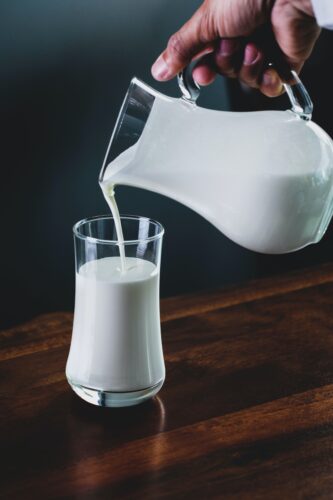Milk is a white liquid food produced by the mammary glands of mammals. It is the primary source of nutrition for young mammals before they are able to digest solid food1 Milk contains almost every single nutrient that your body needs, such as protein, fat, carbohydrate, vitamins, minerals, and water21
Milk can be divided into two types based on its processing: raw milk and pasteurized milk. Raw milk is milk that has not been heated or treated to kill harmful bacteria and pathogens. Pasteurized milk is milk that has been heated to a high temperature for a short time to destroy any harmful microorganisms and extend its shelf life. Pasteurized milk is considered safer and more hygienic than raw milk3

How much do 5 gallons of milk weigh?
The weight of 5 gallons of milk can vary slightly depending on its density and fat content. In general, it is estimated that a gallon of milk weighs around 8.6 to 8.9 pounds (3.9 to 4.0 kilograms), so 5 gallons would weigh approximately 43 to 44.5 pounds (19.5 to 20.2 kilograms).
Is milk good for you?
Yes, milk is a rich source of essential nutrients like calcium, protein, and vitamins. However, some people may have lactose intolerance or a milk protein allergy, so it is important to respect individual needs and preferences.
How long does milk last?
The shelf life of the milk depends on the type and processing. Fresh, unopened milk usually lasts 7-14 days in the refrigerator. Pasteurized and ultra-pasteurized milk have a longer shelf life. Check the milk label for specific information about its shelf life.
Does milk have lactose?
Yes, milk contains lactose, a type of naturally occurring sugar found in dairy products. Some people may have difficulty digesting lactose, which can lead to lactose intolerance symptoms.
What options are there for people who cannot consume milk?
There are several alternatives to cow’s milk, such as almond milk, soy milk, coconut milk, and many more. These options may be suitable for those with lactose intolerance or allergies to milk protein.

Fun facts about milk
- Milk is one of the first drinks that humans consumed in history. Their domestication allowed prehistoric communities to have a more stable source of food and nutrients.
- Milk is an excellent source of calcium, which is essential for the development and maintenance of healthy bones and teeth.
- Milk also contains vitamin D, which helps the body absorb and use calcium more effectively.
- It is estimated that there are around 270 million dairy cows around the world, providing us with a large amount of milk.
- Milk is a versatile ingredient and is used in a wide variety of dairy products, including cheese, yogurt, and butter.
Source:
(1) Milk – Wikipedia. https://en.wikipedia.org/wiki/Milk.
(2) Milk 101: Nutrition Facts and Health Effects. https://www.healthline.com/nutrition/milk.
(3) Milk | Definition, Types, Processing, & Nutritional Value. https://www.britannica.com/topic/milk.
Leave a Reply